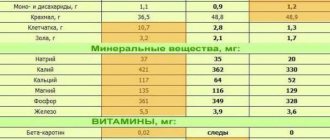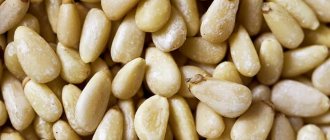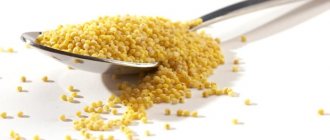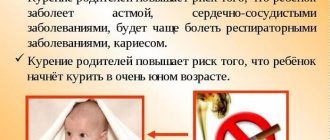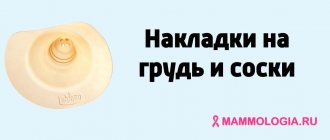Useful elements in herring
Herring is an invaluable source of vitamins and minerals, Omega 3 acids, necessary for the full functioning of all internal organs and systems. Eating this nutritious fish helps the mother increase the fat content and value of breast milk, which ensures the active development of the child.
Composition and beneficial properties of herring:
- Vitamins A, B, D - increase immunity, protect the body from viruses, infections, improve the functioning of the nervous system.
- Omega3 saturated fatty acids strengthen the child’s skeletal elements, improve metabolism, the functioning of the cardiovascular system, and normalize cholesterol levels in the blood.
- Iodine – improves the functioning of the thyroid gland, as well as the endocrine system as a whole.
- Selenium – has an antioxidant effect, inhibits the processes of premature aging of cells, and is considered an effective prevention of cancer.
- Contains an optimally balanced amount of proteins and fats, improving digestion and stimulating metabolism.
The reasons why you can eat herring while breastfeeding lie in its unique biochemical composition. Just 200-250 g of fish contains the daily requirement of vitamin D, as well as proteins necessary for both the mother’s body, weakened after childbirth, and the baby.
When answering whether a nursing mother can eat herring, doctors emphasize that this healthy product must be present in the diet during breastfeeding, but in limited quantities.
The benefits and harms of herring during breastfeeding
The first months after childbirth are accompanied by serious dietary restrictions for the mother, because the nutrition of a nursing woman directly affects the well-being and health of the baby. When composing their diet, many mothers think about whether herring can be eaten while breastfeeding, in what form and quantity it can be consumed.
Useful elements in herring
Herring is an invaluable source of vitamins and minerals, Omega 3 acids, necessary for the full functioning of all internal organs and systems. Eating this nutritious fish helps the mother increase the fat content and value of breast milk, which ensures the active development of the child.
Composition and beneficial properties of herring:
- Vitamins A, B, D - increase immunity, protect the body from viruses, infections, improve the functioning of the nervous system.
- Omega3 saturated fatty acids strengthen the child’s skeletal elements, improve metabolism, the functioning of the cardiovascular system, and normalize cholesterol levels in the blood.
- Iodine – improves the functioning of the thyroid gland, as well as the endocrine system as a whole.
- Selenium – has an antioxidant effect, inhibits the processes of premature aging of cells, and is considered an effective prevention of cancer.
- Contains an optimally balanced amount of proteins and fats, improving digestion and stimulating metabolism.
The reasons why you can eat herring while breastfeeding lie in its unique biochemical composition. Just 200-250 g of fish contains the daily requirement of vitamin D, as well as proteins necessary for both the mother’s body, weakened after childbirth, and the baby.
When answering whether a nursing mother can eat herring, doctors emphasize that this healthy product must be present in the diet during breastfeeding, but in limited quantities.
Harm from herring
When answering the question of mothers whether it is possible to salt herring while breastfeeding, doctors recommend taking into account not only the beneficial properties of this fish, but also its possible harm.
Harm of salted herring during lactation:
- like any other food product, fish can cause an allergic reaction in both adults and newborns;
- when salting herring, many manufacturers use preservatives and other synthetic additives, which can cause individual intolerance to the body;
- a large amount of salt in the product causes fluid retention and edema;
- If a lightly salted product is stored incorrectly, the risk of helminthic infestations increases significantly.
When consuming herring while breastfeeding, you need to remember the existing contraindications. This product should not be eaten if you have gastritis, gastric and duodenal ulcers, arterial hypertension, exacerbation of pancreatitis, or kidney disease. Also, this type of fish is not recommended for consumption in diseases of the digestive system, accompanied by an increased level of gastric acidity.
Can a nursing mother eat salted herring - according to the opinion of many therapists, pediatricians, including Dr. Komarovsky, as well as reviews from many nursing mothers, this product can be included in a woman’s menu after childbirth, but in limited quantities.
Herring under a fur coat when breastfeeding
Many mothers are interested in whether it is possible to eat herring while breastfeeding in the form of salads, which includes herring under a fur coat. The best option would be to avoid such foods in the first two months of the baby’s life.
The main danger of multi-ingredient salads is that they contain several products, each of which can become a potential allergen for the baby. Most often, such dishes are seasoned with mayonnaise or fatty sauces, which are prohibited from being eaten in the first three months after childbirth.
Herring under a fur coat for nursing women:
- herring fillet – 2 pcs;
- boiled potatoes – 3 pcs;
- small boiled beets – 2 pcs;
- boiled carrots – 2 pcs;
- boiled egg – 1-2 pcs;
- onions – 1 piece;
- dill – ½ bunch.
For mayonnaise:
- chicken eggs – 1-2 pcs;
- spicy mustard – ½ tsp;
- freshly squeezed lemon juice – 1 tsp;
- olive oil – 200 ml;
- granulated sugar and salt - to taste.
Beat the chicken egg with a mixer for 5 minutes, then pour in the olive oil in a thin stream, continuing to beat the mixture. The result should be a homogeneous, creamy mass. Add the remaining ingredients to it, beat for a few more minutes.
To prepare the salad, wash, peel, and boil all the vegetables together with the chicken eggs until tender. Cut the fillet with eggs into small cubes, chop the vegetables using a grater.
Lay out the salad in layers - grated potatoes, chopped onions, fillet, eggs, carrots. The top layer of the dish is grated beets. Sprinkle the finished fur coat with finely chopped dill and let it soak for about an hour in the refrigerator.
Is it possible for nursing mothers to have herring under a fur coat? If prepared correctly, such a dish will not cause any harm to the baby. The salad will become healthy only when natural sour cream or homemade mayonnaise is used to dress it.
How many herrings are there?
A nursing mother can eat herring no earlier than the second month after giving birth. The best option would be your own salted herring, which is introduced into the menu gradually and in small quantities.
If you do not have the opportunity to salt the fish yourself, you can use the finished product. It must be fresh and of high quality. For the first time, it is enough to eat 1-2 pieces of herring, and then carefully observe the newborn’s reaction.
Any negative reactions - stomach colic, stool upset, bloating in the baby indicate that the product was introduced into the diet of a nursing mother too early. The next attempt should be postponed for 3-4 weeks - the baby’s digestive system will be strong enough for a new “acquaintance”.
Provided that it is well tolerated and there are no allergic reactions, it is recommended that a nursing woman consume dishes with herring 1-2 times a week. In this case, you need to monitor the serving size - it should be no more than 200-250 g.
Individual intolerance
When deciding whether a nursing mother can eat salted herring or not, you need to take into account that in rare cases this fish can cause individual intolerance on the part of the child’s body.
To prevent the development of an allergic reaction in a newborn, a woman must completely exclude from her diet all foods related to strong allergens. These are bee products, oranges and other citrus fruits, all exotic fruits, all varieties of seafood and nuts, as well as mushrooms and strawberries.
Rules for safe consumption of herring
Herring is introduced into the menu of a nursing woman no earlier than 7-8 weeks after birth. Any new product can be consumed in small quantities, not exceeding 2 pieces, and only if the baby is completely healthy and active. If the baby is bothered by stomach cramps or bloating, it is best to postpone eating dishes with herring for a while.
If the child is feeling well, it is allowed to eat this type of fish 1-2 times a week.
It can be baked or boiled. Smoked herring, which is prepared with a large number of spices and various synthetic additives, flavors and dyes, is prohibited.
Proper herring dishes
Nursing mothers are advised to consume only herring with a minimum amount of salt, spices, vinegar, mayonnaise and other industrially produced fatty sauces. The most preferable option would be home-cooked fish.
Salting herring is very simple - to do this, you need to pour a fresh frozen or fresh fish carcass with a weak salty brine with the addition of a small amount of saffron, cardamom, fresh or dried dill, and dry mustard. The herring can be salted whole or without the head and entrails.
Self-salting herring:
- To prepare the brine, pour 1 tablespoon of granulated sugar and 3-4 tablespoons of table salt into a container with 1 liter of clean water.
- The carcass must be thoroughly washed, then placed inside an enamel or glass container with a lid.
- After this, fill the fish with brine so that it completely covers it, place it on the refrigerator shelf for 4 days.
An equally tasty and healthy dish for a woman during breastfeeding will be herring cooked in a double boiler, boiled or baked in the oven with a small amount of butter.
How to choose herring
Herring will bring maximum benefit to the body of a nursing woman and a newborn only when the fish is chosen correctly. It should be fresh, of high quality, with shiny, “mirror” scales.
Before purchasing, carefully inspect the carcass or fillet - the product should be smooth, elastic, without traces of mucus. The fish should not have plaque, wounds, ulcers or any damage.
It is best to opt for a whole carcass with red, elastic gills. If the fish is sold with the head, its eyes must be transparent. For consumption, do not use fish that has an unpleasant or strongly spicy odor.
Press the fish with your fingers - if there are dents on its surface that do not disappear for several seconds, you should refuse such a purchase.
Herring is a tasty, valuable, nutritious product that must be included in the diet of a nursing woman. It saturates the body of mother and baby with beneficial vitamins, minerals and fatty acids, ensuring the full functioning of internal organs and good health.
Source: https://kinders.online/gv/pravilnoe-pitanie/seledka-pri-gv.html
Harm from herring
When answering the question of mothers whether it is possible to salt herring while breastfeeding, doctors recommend taking into account not only the beneficial properties of this fish, but also its possible harm.
Harm of salted herring during lactation:
- like any other food product, fish can cause an allergic reaction in both adults and newborns;
- when salting herring, many manufacturers use preservatives and other synthetic additives, which can cause individual intolerance to the body;
- a large amount of salt in the product causes fluid retention and edema;
- If a lightly salted product is stored incorrectly, the risk of helminthic infestations increases significantly.
When consuming herring while breastfeeding, you need to remember the existing contraindications. This product should not be eaten if you have gastritis, gastric and duodenal ulcers, arterial hypertension, exacerbation of pancreatitis, or kidney disease. Also, this type of fish is not recommended for consumption in diseases of the digestive system, accompanied by an increased level of gastric acidity.
Can a nursing mother eat salted herring - according to the opinion of many therapists, pediatricians, including Dr. Komarovsky, as well as reviews from many nursing mothers, this product can be included in a woman’s menu after childbirth, but in limited quantities.
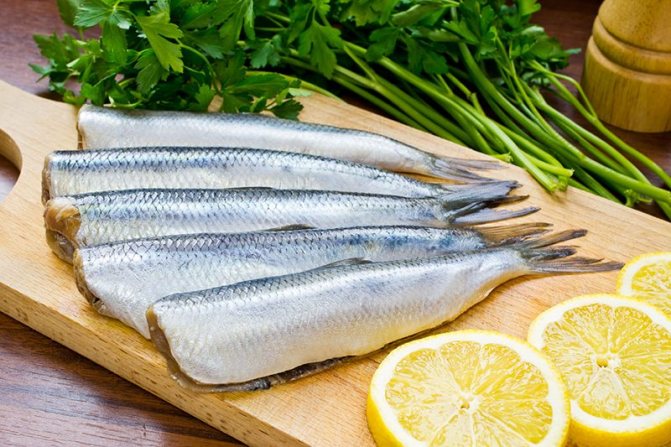
How to eat herring during breastfeeding
After the third month of a baby’s life, it is allowed to eat herring while breastfeeding. First, the herring is prepared in the oven, baked in foil or eaten steamed. The products that the mother consumed will appear in the milk after 4-5 hours. Therefore, the first weeks of a child’s life are connected with the mother; they have the same intestinal microflora.
Cooking methods:
- In salads.
- For a couple.
- Stewed.
Therefore, some products can be harmful to the baby’s health if the mother is careless. The group of allergens includes chocolate, cocoa, fish, seafood, honey, citrus fruits and other products. Each specific case is individual.
We recommend reading: Mint during breastfeeding
Over time, the diet gradually becomes complete, not differing in the choice of products.
A nursing mother is allowed to eat lightly salted home-salted herring. If you can’t salt it yourself, you can buy ready-made herring in a plastic container. You should not choose a product with a lot of seasonings.
During breastfeeding, a young mother is allowed to eat one piece of herring first, monitoring her health. After the baby is born, this product is prohibited. If a rash, redness of the skin, upset stool, or nausea occurs in the baby, the introduction of fish should be postponed for 2-3 months.
If all is well, you can use it gradually increasing the amount.
Herring under a fur coat when breastfeeding
Many mothers are interested in whether it is possible to eat herring while breastfeeding in the form of salads, which includes herring under a fur coat. The best option would be to avoid such foods in the first two months of the baby’s life.
The main danger of multi-ingredient salads is that they contain several products, each of which can become a potential allergen for the baby. Most often, such dishes are seasoned with mayonnaise or fatty sauces, which are prohibited from being eaten in the first three months after childbirth.
Herring under a fur coat for nursing women:
- herring fillet – 2 pcs;
- boiled potatoes – 3 pcs;
- small boiled beets – 2 pcs;
- boiled carrots – 2 pcs;
- boiled egg – 1-2 pcs;
- onions – 1 piece;
- dill – ½ bunch.
For mayonnaise:
- chicken eggs – 1-2 pcs;
- spicy mustard – ½ tsp;
- freshly squeezed lemon juice – 1 tsp;
- olive oil – 200 ml;
- granulated sugar and salt - to taste.
Beat the chicken egg with a mixer for 5 minutes, then pour in the olive oil in a thin stream, continuing to beat the mixture. The result should be a homogeneous, creamy mass. Add the remaining ingredients to it, beat for a few more minutes.
To prepare the salad, wash, peel, and boil all the vegetables together with the chicken eggs until tender. Cut the fillet with eggs into small cubes, chop the vegetables using a grater.
Lay out the salad in layers - grated potatoes, chopped onions, fillet, eggs, carrots. The top layer of the dish is grated beets. Sprinkle the finished fur coat with finely chopped dill and let it soak for about an hour in the refrigerator.
Is it possible for nursing mothers to have herring under a fur coat? If prepared correctly, such a dish will not cause any harm to the baby. The salad will become healthy only when natural sour cream or homemade mayonnaise is used to dress it.

From 3-4 months you can prepare a delicious dietary salad “Herring under a fur coat”.
Salad ingredients:
- Homemade lightly salted herring.
- Boiled carrots, beets, potatoes.
- Onions scalded with boiling water.
- Egg (if the baby is not allergic).
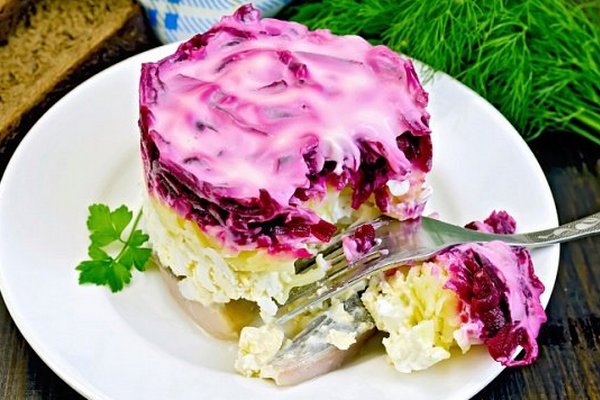
The herring is peeled, boned, and finely cut into cubes. Vegetables are grated on a coarse grater and placed in a dish in layers, alternating in turns. Each layer is coated with sour cream.
You can replace mayonnaise with low-fat sour cream or plain yogurt. If a child is susceptible to allergies, it is better to remove the egg from the composition. You are allowed to consume no more than two tablespoons of this salad per day.
Another cooking option is a potato side dish and herring baked in foil. The fish is washed and the entrails are removed. For taste and sourness, sprinkle with lemon juice, rub with salt, sprinkle with green dill. The herring is wrapped in foil and put in the oven to cook for 20 minutes.
Fish dishes are healthy and necessary to eat twice a week. Before preparing or consuming, check the freshness of the product. The addition of mayonnaise, seasonings, and hot spices is excluded.
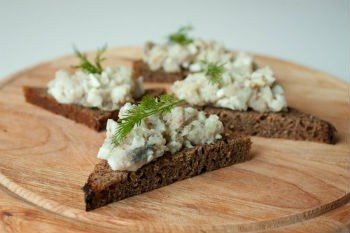
It is recommended to eat a healthy sandwich for tomorrow. For example, a piece of herring is placed on a piece of Borodino bread. You can eat this healthy sandwich several times a week.
We recommend reading: Sugar during breastfeeding: how much can you use and what can you replace it with?
Excessive consumption of fish that is too salty can impair kidney function, increase blood pressure, and change heart rhythm. To avoid this, it is better to review your diet in advance.
How many herrings are there?
A nursing mother can eat herring no earlier than the second month after giving birth. The best option would be your own salted herring, which is introduced into the menu gradually and in small quantities.
If you do not have the opportunity to salt the fish yourself, you can use the finished product. It must be fresh and of high quality. For the first time, it is enough to eat 1-2 pieces of herring, and then carefully observe the newborn’s reaction.
Any negative reactions - stomach colic, stool upset, bloating in the baby indicate that the product was introduced into the diet of a nursing mother too early. The next attempt should be postponed for 3-4 weeks - the baby’s digestive system will be strong enough for a new “acquaintance”.
Provided that it is well tolerated and there are no allergic reactions, it is recommended that a nursing woman consume dishes with herring 1-2 times a week. In this case, you need to monitor the serving size - it should be no more than 200-250 g.
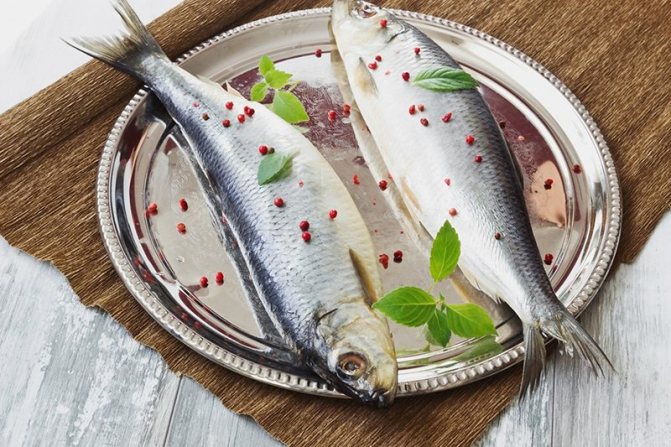
Is herring harmful when breastfeeding?
Modern doctors no longer force nursing mothers to follow a strict diet.
A lack of vitamins, minerals, fatty acids and other beneficial components can have a negative impact on a woman’s health and appearance. However, one should not completely rule out the possibility that the baby will develop an allergic reaction to foods included in his mother’s diet. Breastfeeding women are careful when choosing products. Therefore, they are interested in the questions of whether it is possible to eat herring while breastfeeding (BF), whether it is allowed to eat the “Herring under a fur coat” salad.
Herring and lactation period
From the moment of consumption, the components of the products can be detected in the milk of a nursing woman after a few hours. In the first months of a baby’s life, a nursing mother and child have a common intestinal microflora. This is due to the fact that the baby receives the same components as the mother. Certain foods can cause diathesis, colic or intestinal upset.
Fish is one such product. Quite often it causes an allergic reaction even when cooked in a double boiler. The most dangerous is raw fish, which is the main ingredient for sushi.
Salted herring is not so dangerous if you prepare it at home and use fresh, thoroughly washed fish. In addition, salting will take place in clean conditions without the use of preservatives and other chemical components. It is better not to consume store-bought herring in the first months of a child’s life.
Harm from herring during breastfeeding
Many women ask whether a nursing mother can eat herring, because this product is popular in our country. Doctors recommend refraining from consuming this industrially produced product. The reasons are as follows:
- 100 g of herring contain about 14 g of salt, and with breastfeeding it must be consumed in limited quantities.
- Salting of herring on an industrial scale is done using sodium benzoate and other preservatives. These components can negatively affect the health of mother and child.
- If stored improperly in stores, salted fish may harbor maggots and other insects.
- After the birth of a child, many women suffer from edema, high blood pressure and other diseases; accordingly, the amount of salt must be limited. Commercially produced herring contains salt in huge quantities to increase its shelf life.
This does not mean that a nursing mother should completely give up eating fish. It contains fatty acids necessary for beauty and health. But it is better to give preference to boiled or stewed fish, as well as home-salted herring caviar.
How much herring can you eat during breastfeeding?
Lightly salted herring is not one of the most important foods in the diet of a nursing mother. Therefore, its quantity should be minimal. If a woman cannot resist salted fish, then she is allowed to eat 1-2 pieces from time to time. It is best to limit the consumption of herring to once a week or even less often.
It is recommended to buy frozen herring rather than ready-made herring, clean it thoroughly and marinate it yourself. The amount of salt in such a product should be low. In this case, it is possible to avoid the appearance of swelling, and also to eat only healthy fish.
Is it possible to eat “Herring under a fur coat” salad?
Many people are interested in whether breastfeeding women can enjoy the “Herring under a Fur Coat” salad. To answer this question, it is enough to consider the salad ingredients individually.
It includes boiled potatoes, carrots and beets. These products are approved for use and will only bring benefits. However, it is not recommended for a nursing mother to consume onions.
It can affect the taste of milk and cause colic and bloating.
Mayonnaise is the most harmful and dangerous component of salad. In addition, “store-bought” mayonnaise may contain preservatives, dyes, flavors and other chemical components. You can also make mayonnaise sauce at home.
It contains mustard, vinegar and spices, which are undesirable for use during feeding. The sauce is also based on chicken eggs, which are a strong allergen. Therefore, it is not recommended to use either homemade or, especially, “store-bought” mayonnaise during lactation.
You can replace it with low-fat sour cream, unsweetened yogurt or vegetable oil.
However, the most undesirable component of the salad remains herring. You can prepare an alternative to the “Herring under a fur coat” salad, which includes only healthy ingredients and at the same time has a pleasant taste and low calorie content.
Herring can be replaced with boiled chicken breast or other lean meat. A great option is to use prunes and nuts instead of fish. This will give the salad a piquant and refined taste.
Vegetable oil or yogurt without filler should be used as a dressing. The resulting salad contains all the beneficial vitamins and minerals, a minimum of calories, and is safe for the composition of breast milk.
Conclusion
Lightly salted herring is an undesirable product when breastfeeding. If a young mother cannot completely refuse to eat salted fish, she should cook it herself. This will allow you to eat it with low salt content, without preservatives, flavors and other dangerous components.
Source: https://RazvitieMalysha.ru/grudnichok/grudnoe-vskarmlivanie/seledka-slabosolenaya-i-pod-shuboy.html
Individual intolerance
When deciding whether a nursing mother can eat salted herring or not, you need to take into account that in rare cases this fish can cause individual intolerance on the part of the child’s body.
To prevent the development of an allergic reaction in a newborn, a woman must completely exclude from her diet all foods related to strong allergens. These are bee products, oranges and other citrus fruits, all exotic fruits, all varieties of seafood and nuts, as well as mushrooms and strawberries.
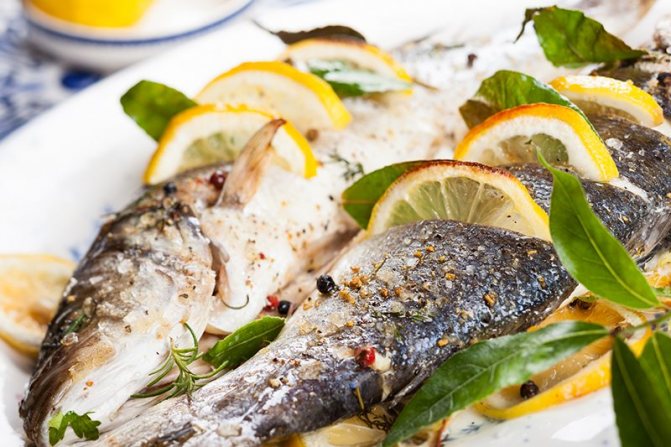
Prohibition during lactation
When including sea fish in the diet, a nursing mother should take into account that its fiber contains salt. In fresh herring there are 6 g per 100 g, in salted herring - 14 g. Therefore, people with hypertension, liver pathologies and a history of edema should limit this product on their table.
After eating salted herring, the body, saturated with salt, accumulates a lot of water. The heart and kidneys begin to work hard to get rid of excess fluid and salt, which provokes tachycardia. Therefore, even herring under a fur coat while breastfeeding can negatively affect a woman’s health if eaten in unlimited quantities.
Interesting! Salads with herring, which have earned the love and popularity of the people during the holidays, are best consumed when the baby begins to move to the common table, since the main ingredient in them is mayonnaise. This product is a dangerous allergen that causes not only diathesis in infants, but also digestive upset.
It is better to exclude herring during lactation if:
- Negative reactions have been observed in an infant;
- Mommy suffers from high stomach acidity;
- The woman has kidney pathologies, bladder diseases, gastrointestinal ulcers, and hypertension. To avoid aggravation of ailments, pickles and marinades are replaced with boiled and steamed fish.
By following all the recommendations of specialists, a breastfeeding woman will be able not only to enjoy her favorite fish, but also to fill her body with all the vital elements.
Rules for safe consumption of herring
Herring is introduced into the menu of a nursing woman no earlier than 7-8 weeks after birth. Any new product can be consumed in small quantities, not exceeding 2 pieces, and only if the baby is completely healthy and active. If the baby is bothered by stomach cramps or bloating, it is best to postpone eating dishes with herring for a while.
If the child is feeling well, it is allowed to eat this type of fish 1-2 times a week.
It can be baked or boiled. Smoked herring, which is prepared with a large number of spices and various synthetic additives, flavors and dyes, is prohibited.
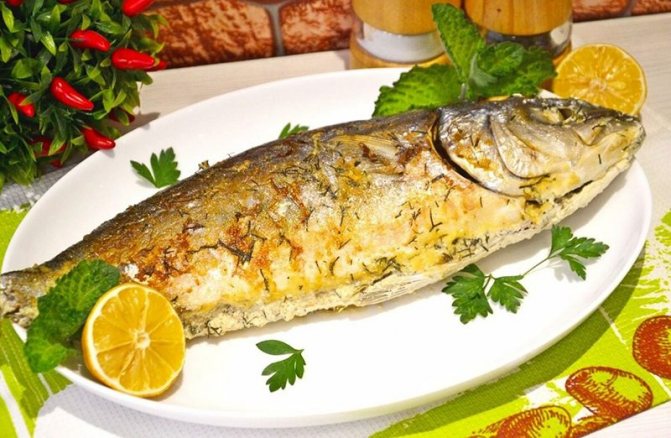
Negative consequences of eating herring during breastfeeding
To ensure a long shelf life, manufacturers treat carcasses with preservatives, such as sodium benzoate, which extends the shelf life several times. In general, the ingredient is quite harmless, but sometimes it can lead to allergies or hives.
A salty product requires drinking a lot, and after a while the need for sweets increases. This vicious circle can lead to obesity problems.
Incorrect processing of fish and its improper storage increase the risk of infection with various parasites.
Proper herring dishes
Nursing mothers are advised to consume only herring with a minimum amount of salt, spices, vinegar, mayonnaise and other industrially produced fatty sauces. The most preferable option would be home-cooked fish.
Salting herring is very simple - to do this, you need to pour a fresh frozen or fresh fish carcass with a weak salty brine with the addition of a small amount of saffron, cardamom, fresh or dried dill, and dry mustard. The herring can be salted whole or without the head and entrails.
Self-salting herring:
- To prepare the brine, pour 1 tablespoon of granulated sugar and 3-4 tablespoons of table salt into a container with 1 liter of clean water.
- The carcass must be thoroughly washed, then placed inside an enamel or glass container with a lid.
- After this, fill the fish with brine so that it completely covers it, place it on the refrigerator shelf for 4 days.
An equally tasty and healthy dish for a woman during breastfeeding will be herring cooked in a double boiler, boiled or baked in the oven with a small amount of butter.
How to choose herring
Herring will bring maximum benefit to the body of a nursing woman and a newborn only when the fish is chosen correctly. It should be fresh, of high quality, with shiny, “mirror” scales.
Before purchasing, carefully inspect the carcass or fillet - the product should be smooth, elastic, without traces of mucus. The fish should not have plaque, wounds, ulcers or any damage.
It is best to opt for a whole carcass with red, elastic gills. If the fish is sold with the head, its eyes must be transparent. For consumption, do not use fish that has an unpleasant or strongly spicy odor.
Press the fish with your fingers - if there are dents on its surface that do not disappear for several seconds, you should refuse such a purchase.
Herring is a tasty, valuable, nutritious product that must be included in the diet of a nursing woman. It saturates the body of mother and baby with beneficial vitamins, minerals and fatty acids, ensuring the full functioning of internal organs and good health.
Can a nursing mother eat herring and what are its benefits during lactation?
Almost no holiday is complete without the famous traditional salad - herring under a fur coat; in addition, many gourmets like to eat this fish separately. In our country, herring is one of the most popular varieties of fish, and therefore the question of its safety for nursing mothers and babies is quite natural.
We’ll answer it right away - undoubtedly, you can eat herring during lactation, even in salted form, but this must be done correctly and only after you make sure that your baby does not have allergies.
This fish itself has truly unique properties that make it not only an extremely tasty product, but also incredibly useful for nursing mothers. Let's take a closer look at the beneficial properties of herring, and at the same time find out why numerous reviews from pediatricians about it are positive.
- Herring is one of the fish species richest in omega-3 fatty acids. These compounds primarily have a beneficial effect on the cardiovascular system. These acids strengthen the walls of blood vessels and make them more elastic, thereby reducing the risk of heart disease and thrombosis. For babies, fatty acids are important because they help the circulatory system develop and strengthen.
- A distinctive feature of herring is its saturation with vitamin D; one serving of this fish contains its daily requirement. This vitamin is known for being one of the most important components of bone tissue and without it normal growth is impossible. This is especially important, first of all, for babies - they are actively growing and developing, and therefore their body’s need for this vitamin is extremely high.
- Herring also contains large amounts of selenium. This natural antioxidant helps the body's cells recover and also removes toxic substances from the body. In addition, antioxidant substances have a positive effect on the strength of the immune system, so herring will come in handy during periods of exacerbation of viral diseases.
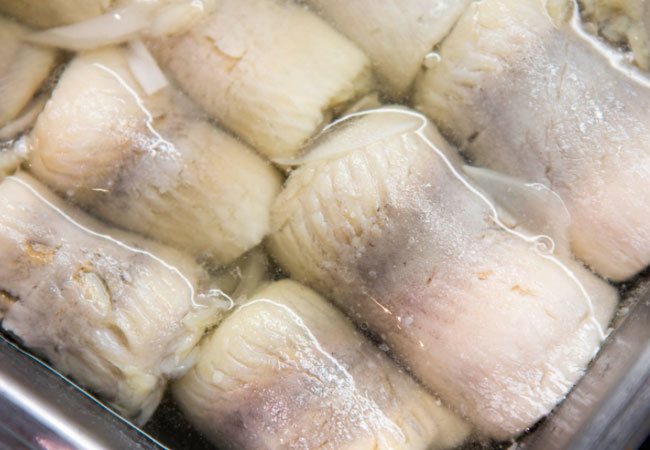
- Herring contains many microelements, but three of them should be especially highlighted: calcium, potassium and iron. Calcium is necessary for bone growth and, together with vitamin D, activates this process. Potassium affects the water-salt balance in the body, removes excess fluid and prevents edema from forming. Iron is involved in hematopoiesis, and therefore helps the production of milk, and it also contributes to better oxygenation of the brain.
- Vitamin B12, also present in herring, has a beneficial effect on the baby’s brain function, strengthens its nervous system and promotes its more active mental development.
- Herring can be confidently classified as a high-protein product. Proteins are extremely important for the human body and, especially for infants, since they are used by our body as material for the formation of new tissues and cells.
- In recent years, doctors around the world have become extremely concerned about the mercury content in fish. Young mothers who love herring have nothing to fear - the natural feature of this fish is that it does not accumulate such toxic substances and is completely safe for humans.
